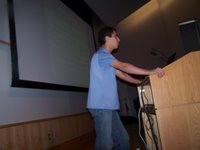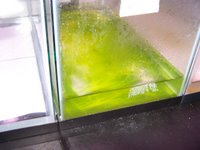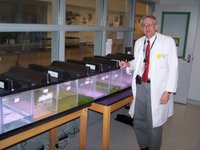Biodiesel Day (we are in good hands)
 Back in May I had the privileged to attend Biodiesel Day at the Greater Hartford Academy of mathematics & Science. At this high school, students had initiated and executed a series of projects to grow their own fuel-stock (algae) and make biodiesel. The scope of their ambition, imagination and accomplishment was staggering. This Biodiesel day was a presentation of their year's work to about 250 of their peers and faculty. Without any teacher input or suggestion, this project had been planned, managed and developed into the basis for real advancement in developing what will eventually become a primary fuel-stock process for the US and probably the world.
Back in May I had the privileged to attend Biodiesel Day at the Greater Hartford Academy of mathematics & Science. At this high school, students had initiated and executed a series of projects to grow their own fuel-stock (algae) and make biodiesel. The scope of their ambition, imagination and accomplishment was staggering. This Biodiesel day was a presentation of their year's work to about 250 of their peers and faculty. Without any teacher input or suggestion, this project had been planned, managed and developed into the basis for real advancement in developing what will eventually become a primary fuel-stock process for the US and probably the world.Some history: the National Renewable Energy Laboratory had a project to investigate potential renewable fuels and had settled on Algae farming as the fastest growing, least land intense and most economical of producing usable fuel....Algae-oil based biodiesel. The project had reached a point of categorizing the algae species most useful at producing plant oil and running a test pond to determine the productivity. Then the project was ended in the early nineties.

What is amazing is that these high school students, who were interested in renewable fuels, have researched and found this promising yet "lost" path of biofuel research on their own and initiated a program to pick up where the government research left off. There are only a few University level experiments running in this area, almost none of which are in the US. Only this month did a few petro-chemical companies announce their algae research divisions (we will see how many pan out). Algae has been determined as the only way to product enough fuel domestically (there isn't enough land for soybeans) to meet our current demand for liquid fuels. (more here: http://www.unh.edu/p2/biodiesel/article_alge.html). When you consider the importance that algae biomass will play in the future, the fact that these students are pioneers in the field is even more impressive.

I was asked to speak and presented a brief overview of current biofuels science, with an aim to put the scope of their work in context to let them realize just how cutting edge their research has been. Gus Kellog of www.greenleafbiofuels.com also spoke more specifically about biodiesel and the roles it could play in our economy and in helping our state. The students presented the summaries of the progress in their work so far, and we also went out to see and smell the Biodiesel Jeep.
 Afterwards, Jake Mendelssohn, a teacher who shared in overseeing the project, showed me around the student's labs.
Afterwards, Jake Mendelssohn, a teacher who shared in overseeing the project, showed me around the student's labs.
These are lucky kids with a chance to work in a school with big budgets, stunning facilities, and amazing teachers. But we are more lucky in that these kids may just be the ones to free this country from foreign oil, save our economy and keep the world in decent shape as you and I become older. Thanks, kids!

0 Comments:
Post a Comment
<< Home